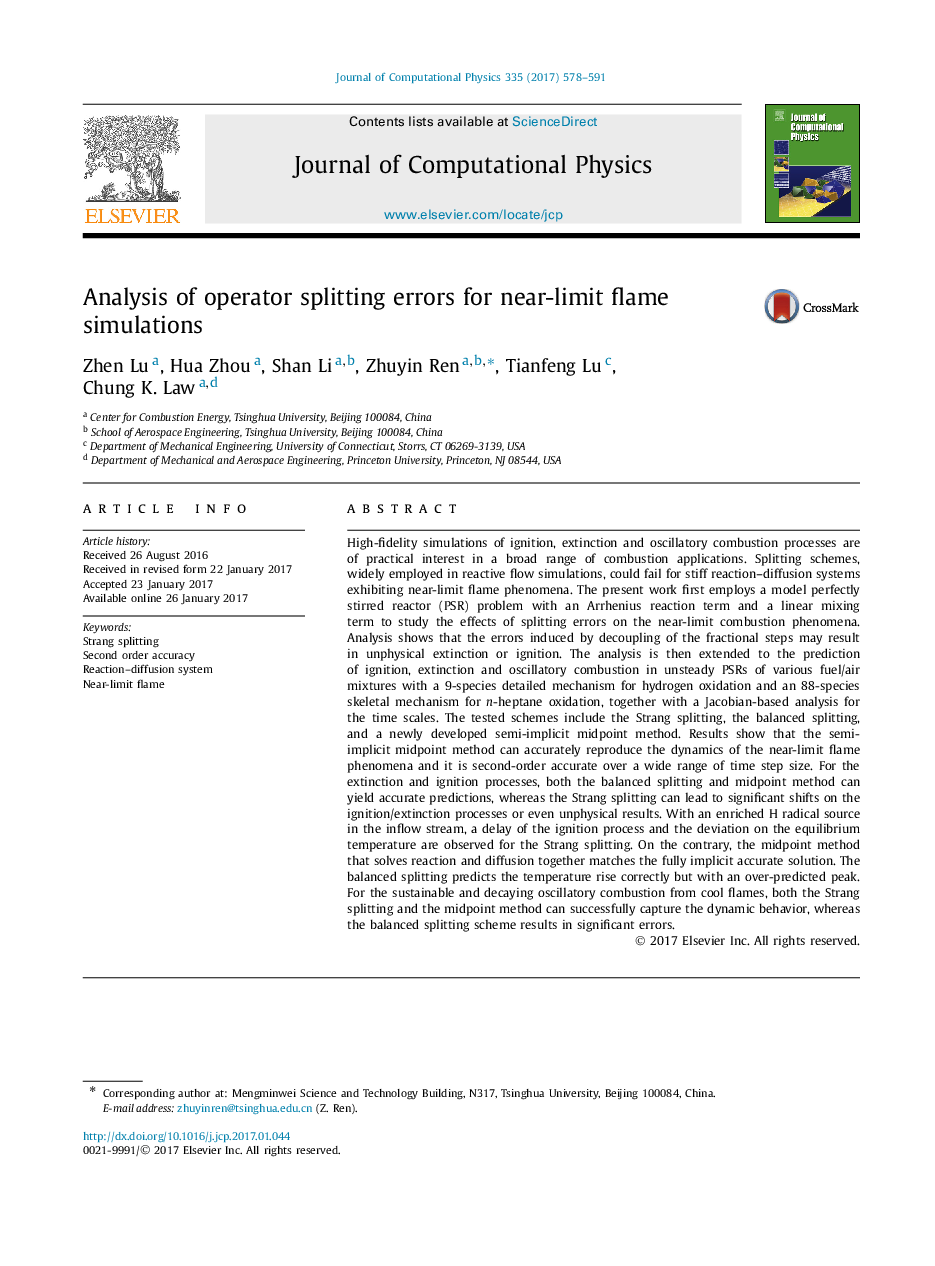| کد مقاله | کد نشریه | سال انتشار | مقاله انگلیسی | نسخه تمام متن |
|---|---|---|---|---|
| 4967539 | 1449378 | 2017 | 14 صفحه PDF | دانلود رایگان |
عنوان انگلیسی مقاله ISI
Analysis of operator splitting errors for near-limit flame simulations
ترجمه فارسی عنوان
تجزیه و تحلیل خطاهای تقسیم اپراتور برای شبیه سازی شعله نزدیک حد
دانلود مقاله + سفارش ترجمه
دانلود مقاله ISI انگلیسی
رایگان برای ایرانیان
کلمات کلیدی
تقسیم غلط، دقت مرتبه دوم، سیستم انتشار واکنش شعله نزدیک به حد،
موضوعات مرتبط
مهندسی و علوم پایه
مهندسی کامپیوتر
نرم افزارهای علوم کامپیوتر
چکیده انگلیسی
High-fidelity simulations of ignition, extinction and oscillatory combustion processes are of practical interest in a broad range of combustion applications. Splitting schemes, widely employed in reactive flow simulations, could fail for stiff reaction-diffusion systems exhibiting near-limit flame phenomena. The present work first employs a model perfectly stirred reactor (PSR) problem with an Arrhenius reaction term and a linear mixing term to study the effects of splitting errors on the near-limit combustion phenomena. Analysis shows that the errors induced by decoupling of the fractional steps may result in unphysical extinction or ignition. The analysis is then extended to the prediction of ignition, extinction and oscillatory combustion in unsteady PSRs of various fuel/air mixtures with a 9-species detailed mechanism for hydrogen oxidation and an 88-species skeletal mechanism for n-heptane oxidation, together with a Jacobian-based analysis for the time scales. The tested schemes include the Strang splitting, the balanced splitting, and a newly developed semi-implicit midpoint method. Results show that the semi-implicit midpoint method can accurately reproduce the dynamics of the near-limit flame phenomena and it is second-order accurate over a wide range of time step size. For the extinction and ignition processes, both the balanced splitting and midpoint method can yield accurate predictions, whereas the Strang splitting can lead to significant shifts on the ignition/extinction processes or even unphysical results. With an enriched H radical source in the inflow stream, a delay of the ignition process and the deviation on the equilibrium temperature are observed for the Strang splitting. On the contrary, the midpoint method that solves reaction and diffusion together matches the fully implicit accurate solution. The balanced splitting predicts the temperature rise correctly but with an over-predicted peak. For the sustainable and decaying oscillatory combustion from cool flames, both the Strang splitting and the midpoint method can successfully capture the dynamic behavior, whereas the balanced splitting scheme results in significant errors.
ناشر
Database: Elsevier - ScienceDirect (ساینس دایرکت)
Journal: Journal of Computational Physics - Volume 335, 15 April 2017, Pages 578-591
Journal: Journal of Computational Physics - Volume 335, 15 April 2017, Pages 578-591
نویسندگان
Zhen Lu, Hua Zhou, Shan Li, Zhuyin Ren, Tianfeng Lu, Chung K. Law,
